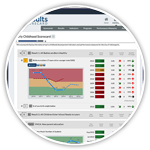FPSI: May 2014 Version 1.6
RBA Basic Ideas
(Translation (friendly / helpful)) (Experimental) (Comments welcome)
How to use this page. Word (choices / options) are shown in (parentheses). (Choose / Select) the words that (make sense / are most clear / are most understandable). And (discard / remove) the other words. Then, re-print this page with the (chosen / selected) words.
1.0 There are two different (kinds / types) of (accountability / responsibility)
1.1 Population (level) (accountability / responsibility)
for (quality of life / well-being) in a (whole / entire / complete) population in a geographic area.
1.1.1 Population (level) (accountability / responsibility) (is about / concerns) conditions we (wish / desire / hope) to (achieve / attain). Example: “(All) Children in our (city / state / country) are healthy.” These conditions (we call / we name / we label) population (results / outcomes / quality of life conditions). These are (ambitions / aspirations / hopes) for our people.
1.1.2 For each population (result / quality of life condition) we (identify / find / choose) (measures / indicators) that tell us (if / to what extent) the population (result / outcome / quality of life condition) is achieved. Example: “Infant mortality (rate / percentage) of (children / infants / newborn babies) who die in the first year of life. (We call / we name / we label) these population (indicators / measures).
1.2 Performance (level) (accountability / responsibility) for the performance of (services / programs), (agencies / organizations) and service systems
1.2.1 We (identify / find) (measures / indicators) that tell us (if / to what extent) the (service / program) (is performing well / is achieving good performance)
1.2.2 These (measures / indicators) (we call / we name / we label) performance (indicators / measures).
1.2.3 In RBA, there are three different (types / kinds) of performance (indicators / measures):
(1) (How much did we do? ) / (How much service we provided?) / (The amount of service?) / (The Quantity of service?)
(2) (How well did we do it?) / ( How well we provided service?) / (The quality of service?)
(3) Is anyone better off? / Is anything or anyone (better/ improved)? / Are our (customers / clients / service users / users of service) (better / improved)?
2.0 RBA includes a thinking process (for the purpose / for the intent) of (improving / getting better). This same thinking process (is used / operates) at (both) the (1.) (population) (level) and (2.) (the service (and) agency (and) service system) levels.
2.1 (Baseline / Trendline): (How good? / What is our condition?) on each (indicator / measure)? This (involves/requires) looking at the data for each (indicator / measure):
2.1.1 (First), we (look at / consider / observe) history. What is the data history for the (indicator / measure)?
2.1.2 (Second), we (think about / consider) the future. (What conditions?) (Where we will be?) in two or three years (if) the current trend continues? We call this a (forecast / projection).
2.1.3 Next, we (draw / put) the history and (forecast / projection) on a graph. There is one graph for each (indicator / measure). We call this graph a (baseline / trendline).
2.1.4 We will succeed (if) we are better than the (forecast / projection). We call this definition of success (turning the curve / bending the curve / changing the trend).
2.2 (Story behind / Explanation) the (baseline / trendline). What are the causes? What explains the (past / historical) data? What explains the (forecast / projection) data?
2.3 Partners. (Other people and other organizations) who can help us. (Identify / Write) this list.
2.4 What works. How (can / could) we do better? What actions (can / could) we take? (Think about / Consider) actions that cost money. (Think about / Consider) actions that cost little money or no money. Think about actions (from / by / of) each partner.
2.5 Action plan. Decide on actions. List these actions. (Start / Begin).
2.6 Repeat this thinking process. Each time you repeat this thinking process, the action plan is (improved / better)



